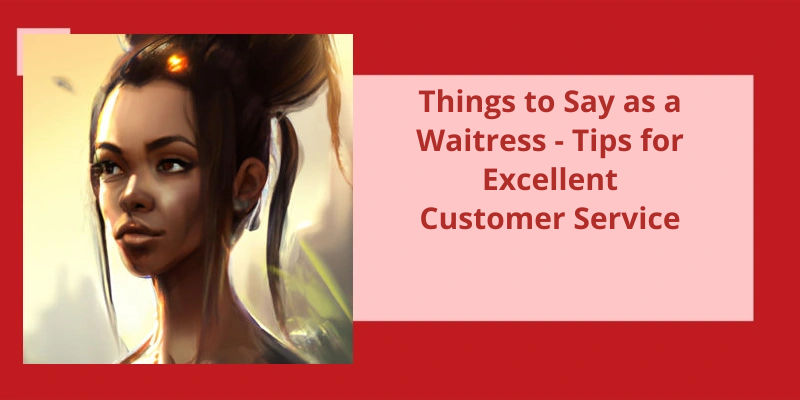As a waitress, your job is to not only serve food and drinks to customers, but also provide exceptional customer service. From greeting and seating guests to taking orders and delivering food, there are a multitude of things a waitress must say in order to ensure a pleasant dining experience. As the first point of contact for customers, it's important to greet them warmly and make them feel welcome. Asking if they’d like help or taking their coat is a nice touch that can set the tone for the rest of the meal. Additionally, being able to answer questions and make menu suggestions can enhance the overall dining experience. Overall, the success of a restaurant largely depends on the efforts of it’s wait staff, and mastering the art of communication is at the core of being a great waitress.
What Are My Strengths as a Waitress?
Being able to deliver high-quality customer service is one of my greatest strengths. I’m able to keep up with a fast-paced environment while maintaining a positive attitude and ensuring that guests have an enjoyable dining experience. I’m intuitive and attentive to guests, listening to their needs and responding to their requests promptly. I take pride in ensuring that the guests are satisfied and they receive the best service possible.
ORGANIZATION AND TIME MANAGEMENT – Another one of my strengths as a waitress is organization and time management. It’s important to keep track of multiple tables and orders while ensuring a smooth flow of service. I’m able to efficiently manage my time and organize my tasks to provide great service to all my customers. I’ve an eye for detail and can quickly assess the needs of the customers to provide relevant and timely service.
TEAMWORK AND COMMUNICATION – Working in a team is essential for providing great service in a restaurant setting. I understand the importance of communication and collaboration with my team members. I always work to build positive relationships with my colleagues, respecting their opinions and actively listening to their feedback. By working together, we can provide great service to our guests.
KNOWLEDGE OF FOOD AND BEVERAGES – As a waitress, it’s important to have knowledge of the different food and drink options on the menu. I take the time to familiarize myself with the menu, asking questions and tasting new dishes to better assist my guests. I’m also aware of any food allergies or dietary restrictions that a guest may have and make appropriate recommendations based on their needs.
ABILITY TO WORK UNDER PRESSURE – Being a waiter can be a challenging job that requires you to work under pressure during peak hours. However, I’m able to manage the stress and deliver excellent service without compromising on quality. I’m able to multitask, prioritize tasks and manage my time effectively to ensure that guests receive prompt and efficient service.
INTEGRITY AND PROFESSIONALISM – Finally, being a professional and maintaining integrity is an essential strength for a waitress. I take pride in my work, always aiming to provide great service to every customer. I’m punctual, dependable, and always willing to go the extra mile to ensure that guests have a positive dining experience. I understand the importance of being professional and respectful, and I strive to maintain a polite and friendly demeanor while on the job.
Sales Skills: Upselling Menu Items or Beverages to Increase Revenue for the Restaurant
- Highlight popular dishes or drinks to customers
- Suggest add-ons or upgrades to their meal or drink order
- Offer deals or specials for certain items
- Use descriptive language to make items sound more appealing
- Encourage customers to try new dishes or drinks
- Provide recommendations based on customer preferences
- Upsell during slow periods or when customers have already expressed interest in additional items
- Train staff on upselling techniques and provide incentives for successful upsells
In any restaurant or food establishment, the quality of service and a pleasant overall experience for the guests holds utmost importance. The qualities of a good Waiter/Waitress bring a lot more to the table than just taking orders and serving food. They represent the establishment and have a significant role in enhancing the guest experience. So, what makes a good personality for a waitress? Let’s delve deeper into it.
What Is a Good Personality for a Waitress?
First and foremost, a good personality for a waitress involves being friendly and patient. Customers rely on their servers to guide them through their dining experience, from suggestions on menu items to addressing any concerns or issues that may arise. A cheerful demeanor can go a long way in making patrons feel welcome and appreciated. Patience is also key, as it isn’t uncommon for busy restaurants to be filled with customers requiring a bit of extra attention or those who may be more difficult to please.
Restaurants are a fast-paced environment with constant demands, and it’s up to the waitress to react and respond efficiently to any situation that presents itself. This may include handling food allergies or substitutions, managing a sudden influx of customers, or resolving any disputes between customers.
Attention to detail and multitasking skills are equally important for a successful waitress. In todays fast-paced world, customers expect to get what they want quickly and efficiently. A good waitress must be organized and detail-oriented to keep track of multiple orders and requests simultaneously. They must be able to prioritize their tasks, ensuring that all orders are accurate and delivered to the table in a timely fashion.
Finally, a good waitress should have a positive attitude towards their job, colleagues, and customers. It can be challenging working in the service industry, but a positive outlook can be infectious and create a pleasant working environment for everyone.
The Importance of Strong Communication Skills in the Role of a Waitress
As a waitress, it’s essential to have strong communication skills for a number of reasons. Effective communication with customers can help to build strong relationships and ensure that their needs are met. Additionally, clear communication with kitchen and bar staff is crucial to ensure that orders are accurate and prepared in a timely manner. Good communication can also help to defuse challenging situations and ensure that any issues are resolved quickly and efficiently. Therefore, strong communication skills are vital to being successful as a waitress.
Source: Waiter/Waitress job description – Workable resources
When it comes to dining out, the conversation between the customer and the waiter is an essential part of the experience. However, initiating this discussion can be challenging, especially if you’re a shy person. Fortunately, there are several simple and effective ways to start a conversation with your waiter without feeling awkward, and we’ll cover them here.
How Do You Start a Conversation With a Waiter?
Starting a conversation with a waiter may seem like a small thing. However, it can add a personal touch to your dining experience and help you build a better connection with the staff at the restaurant. The first step is to simply say hi and smile. A friendly greeting can go a long way in breaking the ice.
You can also try commenting on their day. Ask them how it’s been so far or if they’ve had any interesting experiences while serving customers. This can open up a dialogue and create a more relaxed atmosphere for both of you. It shows that you’re interested in their lives beyond their role as a server.
Another simple way to start a conversation with a waiter is to ask for their name. This not only shows that you’re interested in them as a person but also provides a more personalized experience for you. Using a person’s name can make the interaction feel more familiar and less formal.
You can also try learning about the menu or restaurant. Ask the waiter about the specialties or their favorite dishes. This can give you a better idea of what to order and can create a topic of conversation that you both can relate to. Additionally, it shows that you’re interested in the food and the restaurant’s unique offerings.
Asking for recommendations can be another way to start a conversation with a waiter. It shows that you value their opinion and expertise. This can also help you discover new flavors or dishes that you may not have otherwise considered.
Thanking your waiter for their service is always appreciated. It can create a positive experience for both of you and set the tone for a relaxed and enjoyable dining experience. Complimenting them personally can also show your appreciation for their hard work and their efforts in making your dining experience a pleasant one.
Finally, asking about their work experience can also be a way to start a conversation with a waiter. This can give you an insight into the challenges and rewards of working in the service industry. It can also help you appreciate their hard work and dedication to their job.
How to Handle Difficult or Stressful Situations With a Waiter (e.g. Mistakes With an Order, Delays in Service)
This article provides tips on handling difficult or stressful situations when dealing with a waiter such as mistakes with an order or delays in service. It emphasizes being calm, respectful, and clear in communicating one’s concerns or dissatisfaction. The article also suggests being proactive and trying to resolve issues in a collaborative and constructive manner.
As a restaurant patron, being greeted with a warm smile and friendly manner from your waiter can instantly set the tone for a memorable dining experience. And while there are many things a waiter might say to show their appreciation for your business, one of the most common phrases is simply, “I hope you enjoy your meal.” This small gesture can go a long way in making customers feel valued and respected, while also setting expectations for the level of service they can expect throughout their meal.
What Should a Waiter Say to a Customer?
The role of a waiter/waitress is to enhance the dining experience of customers by ensuring that their needs are met. This includes greeting customers, taking their orders, serving their meals, and providing any necessary assistance. One of the most common phrases uttered by waiters to their customers is “I hope you enjoy your meal”. This simple phrase is an expression of the waiter’s desire to ensure that the customer is satisfied with their dining experience.
While the phrase may seem like a formality, it’s an important aspect of the waiter’s job. This phrase also has a psychological effect on the customer as it sets an expectation that their meal will be enjoyable. It creates a positive atmosphere which can further enhance the customer’s dining experience.
By showing genuine interest in the customer’s satisfaction, the waiter can build a connection with the customer which can lead to increased loyalty and repeat business. It’s also an opportunity for the waiter to receive feedback on the food and service, which can be beneficial for future diners.
It’s important that the phrase is delivered sincerely and with a smile. If the waiter appears insincere or uninterested, it can have the opposite effect and damage the dining experience. Waiters also need to ensure that they’re attentive throughout the meal and be prepared to address any concerns or issues that the customer may have.
It’s a simple but effective way of establishing a connection with the customer and ensuring that their needs are being met. By using this phrase sincerely and with a smile, a waiter can set an expectation that the customer’s meal will be enjoyable and positive. As customers are more likely to return to restaurants where they’ve had a positive experience, saying “I hope you enjoy your meal” isn’t just a nicety but a smart business strategy.
Tips on How to Approach Customers When Taking Their Orders
- Be friendly and approachable
- Greet the customer with a smile
- Introduce yourself and ask for their name, this will create a personal connection
- Listen carefully and repeat the order back to the customer to ensure accuracy
- Suggest popular items or specials
- Ask if they’ve any dietary restrictions or allergies
- Provide recommendations based on their preferences
- Offer add-ons or upgrades to their order
- Thank them for their business and invite them back
Providing excellent service in the restaurant industry is crucial and starts with how a waiter talks to a customer. It’s all about speaking appropriately, using respectful titles, and being an active listener. The goal is to make the dining experience enjoyable and memorable, and it all starts with good communication.
How Should a Waiter Talk to a Customer?
As a waiter or server, the way you speak to customers can greatly affect their dining experience. The first thing to keep in mind is to speak appropriately. Using respectful titles such as sir, maam, and miss can help establish a professional and polite atmosphere. Avoid using slang or unfamiliar language that may confuse or offend your diners.
Another important aspect to keep in mind is to greet your diners as soon as they walk in the door. A warm smile and a friendly hello can make them feel welcomed and valued. It’s also important to avoid interrupting your customers while they’re speaking. This can be seen as rude and may make them feel ignored or disrespected.
Pay close attention to their orders and ask clarifying questions if necessary. Repeat their orders to make sure you get it right. This demonstrates that you’re taking good care of them and that you’re committed to delivering a great dining experience.
Being thoroughly versed on your menu is also crucial. This will enable you to answer customer questions about different menu items, offer suggestions or provide recommendations based on their preferences. It shows that you’re knowledgeable about the food and drinks you serve and can help to make the dining experience even better for your customers.
Lastly, it’s important to maintain a positive attitude throughout the entire customer interaction. Even if the customer becomes difficult or demanding, you should remain patient, calm, and professional. Remember that you’re there to provide a service, and your willingness to satisfy the customers needs can help turn a negative experience into a positive one. All in all, the way you speak to your customers can make or break their dining experience, so it’s important to always speak appropriately and with respect.
Tips for Handling Difficult Customers or Complaints
As a business owner or employee, it’s important to know how to handle difficult customers or complaints. Some tips include listening actively, showing empathy, staying calm and professional, offering solutions, and following up to ensure customer satisfaction. Handling difficult situations with grace and professionalism can help improve customer relationships and maintain a positive reputation for your business.
Conclusion
It requires exceptional interpersonal skills, attention to detail, and a willingness to go above and beyond to ensure that every customer has a positive experience. By using friendly, polite language and taking a proactive approach to customer service, waitresses can create a welcoming atmosphere and make customers feel valued and appreciated.






